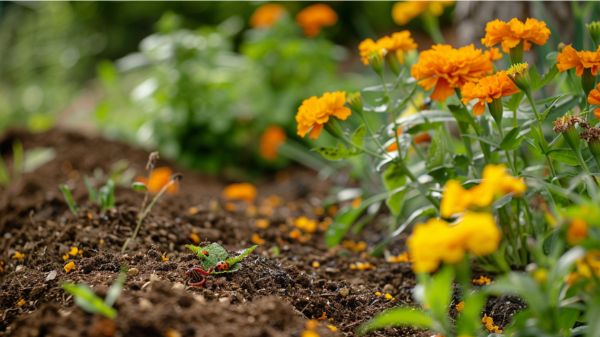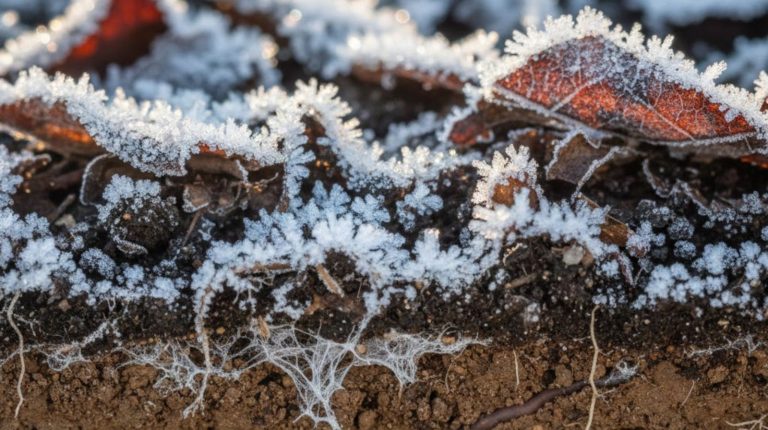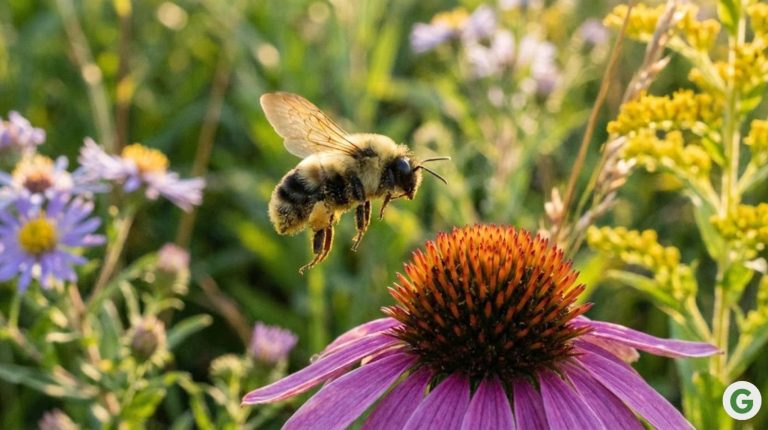Did you know that neem oil can be a powerful tool to combat soil pests in your garden? With a myriad of natural pest control methods at your disposal, from using diatomaceous earth to introducing beneficial nematodes, you can effectively manage pest populations without resorting to harmful chemicals.
These top 10 tips offer sustainable solutions that not only protect your plants but also contribute to the overall health of your garden ecosystem. So, are you ready to discover how to maintain a thriving garden using eco-friendly practices?
Key Takeaways
- Utilize natural pest control products like neem oil and diatomaceous earth for soil protection.
- Implement biological methods such as beneficial nematodes and companion planting for effective pest management.
- Employ physical control measures like row covers and sticky traps to prevent and monitor soil pests.
- Prepare soil for pest resistance by enhancing plant resilience, maintaining optimal conditions, and promoting plant health.
Neem Oil Application in Soil
When combating soil-dwelling pests like nematodes, grubs, and caterpillars, the application of neem oil proves to be an effective and environmentally friendly solution. Neem oil, derived from the seeds of the neem tree, acts as a natural pesticide disrupting the life cycle of harmful insects in the soil.
This organic pest control method not only helps in managing these pests but also aids in preventing fungal diseases while promoting overall plant health. The beauty of using neem oil lies in its eco-friendly nature, as it doesn’t harm beneficial insects essential for soil health.
Diatomaceous Earth for Soil Pests
Diatomaceous Earth, a sedimentary rock powder, acts as a potent weapon against soil pests such as slugs, beetles, and caterpillars. By dehydrating and disrupting the exoskeleton of insects, it eliminates them without resorting to harmful chemicals.
Utilizing Diatomaceous Earth in your soil not only safeguards your plants but also promotes eco-friendly pest control practices.
Effective Soil Pest Control
For effective control of soil pests, consider utilizing Diatomaceous Earth, a natural method that dehydrates and disrupts the exoskeleton of insects like beetles, ants, and slugs. This organic solution is safe for plants, animals, and humans but lethal to pests, making it an effective choice for pest management.
Diatomaceous Earth can be sprinkled around plant bases or on affected soil areas to create a barrier that pests cannot cross, reducing infestations. This soil amendment, composed of fossilized algae called diatoms, contains sharp edges that puncture and dehydrate insects upon contact.
Regular application of Diatomaceous Earth can help maintain a pest-free environment in your garden while promoting healthy plant growth.
| Benefits of Diatomaceous Earth | |
|---|---|
| Safe for plants, animals, and humans | Effective against beetles, ants, and slugs |
| Forms a barrier against pests | Promotes healthy plant growth |
Application Tips for Diatomaceous
Applying diatomaceous earth effectively involves creating a continuous barrier around plant bases or on the soil surface to ensure thorough protection against soil pests. This natural soil amendment, known for its pest control properties, works by dehydrating and eliminating pests like slugs and beetles upon contact.
Opt for food-grade diatomaceous earth in organic gardening to steer clear of harmful chemicals, keeping your garden eco-friendly. It’s safe for your plants, pets, and beneficial insects, making it a preferred choice for many gardeners.
Remember to reapply diatomaceous earth after rain or watering to maintain its efficacy in controlling soil pests. By following these application tips, you can harness the power of diatomaceous earth for a pest-free garden.
Utilizing Beneficial Nematodes in Soil
Beneficial nematodes, being microscopic roundworms, are effective natural predators that actively seek out and parasitize soil-dwelling pests like grubs and caterpillars. When considering utilizing beneficial nematodes in your soil, here are some key points to keep in mind:
- Natural Predators: Beneficial nematodes are natural enemies of soil-dwelling pests, providing a sustainable pest control solution.
- Population Reduction: These nematodes help reduce the populations of harmful insects in the soil, promoting a healthier ecosystem.
- Safe for Environment: Beneficial nematodes are eco-friendly and don’t harm plants, humans, pets, or beneficial insects.
- Easy Application: Applying beneficial nematodes to the soil is a simple and effective way to combat pest infestations.
- Promotes Balance: Using beneficial nematodes helps maintain a healthy balance in your garden, reducing the need for chemical pesticides.
Companion Planting for Soil Pest Control
Plant synergy benefits can be harnessed through strategic companion planting to naturally repel soil pests. Pairing plants like marigolds, basil, mint, and chives can create a pest-resistant environment in your soil.
Utilizing garlic, sunflowers, and dill in your companion planting scheme can further enhance natural pest control measures.
Plant Synergy Benefits
By interplanting specific crops in your garden, you can harness the natural synergy between plants to effectively control soil pests. When you strategically pair certain plants, you create a protective environment that deters pests naturally. Consider these plant synergy benefits for effective soil pest control:
- Companion planting with marigolds: Repels nematodes and aphids from the soil.
- Basil plantings: Deter soil pests like mosquitoes when grown together.
- Herbs like mint near vegetables: Effectively deter soil-dwelling pests.
- Interplanting beans with corn: Improves soil fertility and reduces pest risk.
- Crop rotation with legumes: Helps control soil pests by disrupting their life cycles.
Harness the power of plant partnerships to maintain a healthy and pest-resistant garden soil.
Pest-Repelling Plant Pairs
Harness the natural pest-repelling properties of specific plant pairs through companion planting to effectively deter pests and maintain soil fertility in your garden.
- Planting marigolds near tomatoes creates a protective barrier against nematodes, enhancing soil health.
- Pairing basil with peppers helps repel aphids and spider mites, contributing to a healthy soil environment.
- Growing chives alongside carrots not only prevents carrot flies but also enriches soil biodiversity.
- Interplanting garlic with roses acts as a natural aphid deterrent while promoting soil fertility.
- Combining thyme with cabbage can effectively ward off cabbage worms, promoting a robust and pest-free garden ecosystem.
Essential Oils for Soil Protection
When safeguarding your soil against pests and insects, consider utilizing the protective properties of essential oils like rosemary, peppermint, and lavender. These oils have natural properties that repel pests without harmful chemicals, making them a safe and eco-friendly option for soil protection.
Here are some practical tips for using essential oils in your soil:
- Dilute essential oils in water and spray them on the soil to create a protective barrier.
- Enhance the soil’s health and microbial activity by using essential oils regularly.
- Mix different oils for a more potent pest-repelling effect.
- Reapply the oil mixture after heavy rainfall or watering.
- Experiment with other essential oils like eucalyptus or tea tree for additional protection.
Using Organic Pesticides in Soil
To further fortify your soil against pests and insects, consider incorporating organic pesticides that target specific pests while preserving the health of beneficial soil organisms. Neem oil, derived from the neem tree, is an effective organic pesticide that disrupts pests’ life cycles without harming the soil microbiome.
By applying organic pesticides in soil, you can maintain a healthy ecosystem while controlling soil-dwelling pests. Organic pesticides offer a natural alternative to chemical pesticides, promoting sustainable gardening practices and minimizing environmental impact.
Choosing organic pest control methods not only safeguards your soil but also contributes to a more balanced and eco-friendly approach to pest management in your gardening endeavors.
Related Post: Top Practices for Indoor Gardening Pest Control.
Implementing Row Covers in Soil
Consider employing row covers as a practical and effective method to shield your soil from pests such as insects and birds. These floating row covers provide a natural way to control pests in your garden while promoting healthy plant growth.
Here are some key points to keep in mind:
- Physical Barrier: Row covers act as a barrier against pests, preventing them from reaching your soil.
- Allow Essential Elements: They permit sunlight, water, and air to pass through, nurturing the soil and plants.
- Lightweight and Easy: Row covers are typically made from materials like Agribon, making them easy to handle and install.
- Early Prevention: Using row covers early in the season can prevent pest infestations and maintain soil health.
- Environmentally Friendly: This method is sustainable, eco-friendly, and supports optimal plant growth.
Sticky Traps for Soil Pest Monitoring
Implementing sticky traps for soil pest monitoring presents a proactive solution in detecting and managing soil pests such as fungus gnats, thrips, and other crawling insects effectively. These traps use a sticky surface to catch and trap pests, aiding in early detection and control.
By using sticky traps, you can identify pest populations in the soil, preventing potential damage to your plants. The best part is that sticky traps are non-toxic and safe for use in organic gardening practices.
Regularly inspecting these traps can provide valuable information on the types and numbers of soil pests present, helping you take timely and appropriate measures to protect your plants naturally.
Introducing Natural Predators in Soil
Enhance natural pest control in your soil by introducing a variety of beneficial predators that target and eliminate harmful soil-dwelling pests effectively. These allies in your garden ecosystem play a crucial role in maintaining a healthy balance and reducing the need for chemical interventions. Consider incorporating the following natural predators to combat soil pests:
- Beneficial Nematodes: Control grubs, weevils, and cutworms naturally.
- Predator Mites: Feed on harmful pest eggs and larvae in the soil.
- Ground Beetles: Consume caterpillars, slugs, and snails.
- Parasitic Wasps: Lay eggs on caterpillars and beetle larvae.
- Earthworms: Improve soil health while preying on small insects and larvae.
Soil Preparation for Pest Resistance
Prepare your soil thoughtfully to boost plant resilience against pests and diseases. Enhance soil structure and nutrient content by incorporating organic matter, which supports healthy plant growth and aids in plant resistance.
Optimal soil pH levels play a crucial role in deterring certain pests from thriving in your garden. Ensure well-draining soil to prevent waterlogged conditions that can attract harmful pests.
Conduct soil testing to pinpoint any nutrient deficiencies or imbalances that might make your plants more susceptible to pest infestations. By addressing these factors through proper soil preparation, you can create an environment that promotes plant health and resilience, ultimately reducing the risk of pest-related issues in your garden.
Frequently Asked Questions
How Do You Get Rid of Pests in Soil Naturally?
To naturally rid soil pests, introduce beneficial insects, practice companion planting, apply neem oil, use diatomaceous earth, create a vinegar spray, set up a garlic barrier, and utilize coffee grounds. These methods provide effective, eco-friendly pest control.
How Do I Get Rid of Bugs in My Garden Soil Before Planting?
To get rid of bugs in your garden soil before planting, use organic solutions like introducing beneficial insects, companion planting, soil amendments, neem oil, diatomaceous earth, and garlic spray. These methods naturally control pests, promoting a healthy garden.
What’s a Good Natural Pesticide?
For a good natural pesticide, consider essential oils like peppermint, eucalyptus, and lavender. Neem oil disrupts pest life cycles effectively. Diatomaceous earth is a safe option for insect control. Homemade sprays with garlic, cayenne, and soap are eco-friendly solutions.
How Do You Make Homemade Pest Control?
You can easily whip up a DIY insect repellent using organic solutions like garlic, chili peppers, and dish soap. Mix in water, test on a small area, then apply sparingly for non-toxic, eco-friendly pest control.
Conclusion
Implementing these natural pest control methods in your soil can help you create a thriving garden ecosystem free from harmful chemicals. Just like a well-oiled machine, your garden will be in perfect balance, with pests kept at bay and your plants flourishing.
So why not give these eco-friendly techniques a try and see your garden thrive like never before? Remember, a healthy garden is a happy garden!




